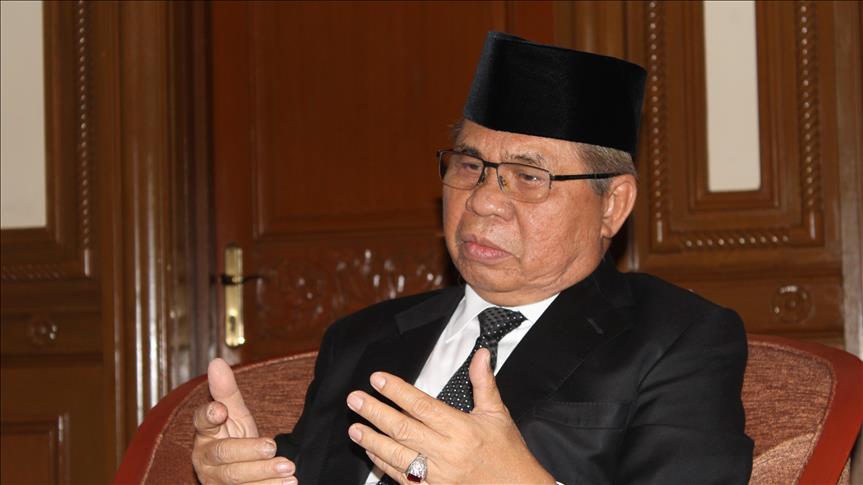We are almost at another milestone in our struggle: Al-Hajj Murad Ebrahim after ratification of Philippines' Bangsamoro Law

Moro Islamic Liberation Front (MILF) chairman Murad Ebrahim
Moro Islamic Liberation Front (MILF) Chairman Al-Hajj Murad Ebrahim has welcomed the ratification of the Bangsamoro Law -- a key piece of legislation for expanded autonomy in a region of the southern Philippines.
"We are almost at another milestone in our revolutionary struggle," Ebrahim said in an interview with the Foreign Correspondents' Association of the Philippines, which was published on its Twitter account.
"We've spent the entire better part of our lives in the struggle; as a person, the tendency is to ask whether we can already retire. But we know that there will be more challenges in the future.
"So we have to force ourselves to keep working so that the Bangsamoro will really work," he said, stating that he hoped the peace agreement to be the last.
"We continue to uphold the peace process as long as we see it can move forward."
The MILF chairman also said, "Turkey is very active in supporting the normalization process".
"We see now that the law that will be passed is a good start that we can work with, but the MILF will still conduct consultations with our people. Any success will be through the support of majority of our people," he said.
He also said further discussions on how to approach decommissioning will be made as MILF "generally agreed" on decommissioning.
Splinter groups in the region "capitalized on the past failures of the peace process," he said.
"We are confident that if there is a political solution acceptable to the Bangsamoro, they will be brought to the mainstream; no choice for them but to join [the Bangsamoro]," he said.
Ebrahim also addressed the issue of education, stating it will be a priority since the region lags behind in that sector.
"The only way to get our people to support the peace process is for them to understand that they will benefit from it," he said.
"The next challenge is the plebiscite. But after 40 years of challenges, we are confident that we can surpass the next challenges."
After a one-day delay, a key piece of legislation for expanded autonomy in the southern Philippines region was passed by the House of Representatives on Tuesday, and is due to be signed into law by Philippines President Rodrigo Duterte.
The measure, which aims to grant wider autonomy for the Bangsamoro – a collective term for Filipino Muslims – would replace the existing Autonomous Region in Muslim Mindanao with the Bangsamoro Autonomous Region – a region with more political and fiscal powers, including a bigger annual block grant equivalent to five percent of the total national internal revenue collection.
The Moro Islamic Liberation Front, the largest Moro rebel group in the Philippines, had forged the Bangsamoro Law with government representatives as one of the requirements of the peace agreement it signed in 2014 with then-President Benigno Aquino III.
"We are almost at another milestone in our revolutionary struggle," Ebrahim said in an interview with the Foreign Correspondents' Association of the Philippines, which was published on its Twitter account.
"We've spent the entire better part of our lives in the struggle; as a person, the tendency is to ask whether we can already retire. But we know that there will be more challenges in the future.
"So we have to force ourselves to keep working so that the Bangsamoro will really work," he said, stating that he hoped the peace agreement to be the last.
"We continue to uphold the peace process as long as we see it can move forward."
The MILF chairman also said, "Turkey is very active in supporting the normalization process".
"We see now that the law that will be passed is a good start that we can work with, but the MILF will still conduct consultations with our people. Any success will be through the support of majority of our people," he said.
He also said further discussions on how to approach decommissioning will be made as MILF "generally agreed" on decommissioning.
Splinter groups in the region "capitalized on the past failures of the peace process," he said.
"We are confident that if there is a political solution acceptable to the Bangsamoro, they will be brought to the mainstream; no choice for them but to join [the Bangsamoro]," he said.
Ebrahim also addressed the issue of education, stating it will be a priority since the region lags behind in that sector.
"The only way to get our people to support the peace process is for them to understand that they will benefit from it," he said.
"The next challenge is the plebiscite. But after 40 years of challenges, we are confident that we can surpass the next challenges."
After a one-day delay, a key piece of legislation for expanded autonomy in the southern Philippines region was passed by the House of Representatives on Tuesday, and is due to be signed into law by Philippines President Rodrigo Duterte.
The measure, which aims to grant wider autonomy for the Bangsamoro – a collective term for Filipino Muslims – would replace the existing Autonomous Region in Muslim Mindanao with the Bangsamoro Autonomous Region – a region with more political and fiscal powers, including a bigger annual block grant equivalent to five percent of the total national internal revenue collection.
The Moro Islamic Liberation Front, the largest Moro rebel group in the Philippines, had forged the Bangsamoro Law with government representatives as one of the requirements of the peace agreement it signed in 2014 with then-President Benigno Aquino III.

No comments:
Post a Comment
Note: Only a member of this blog may post a comment.